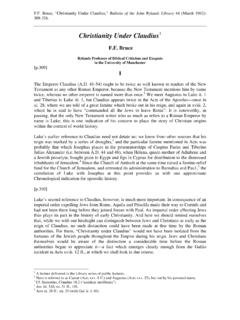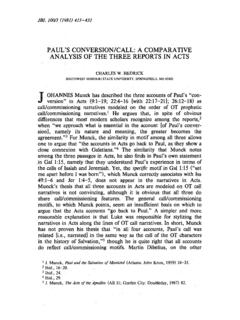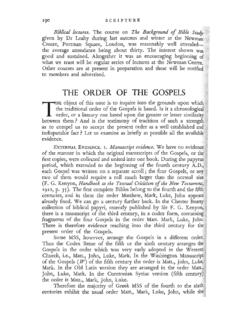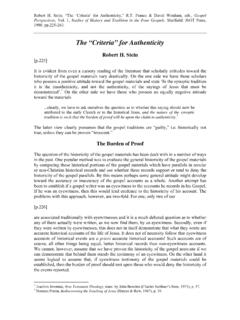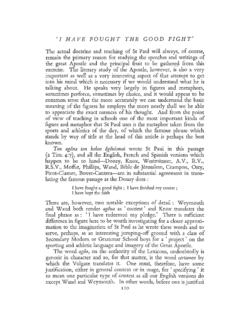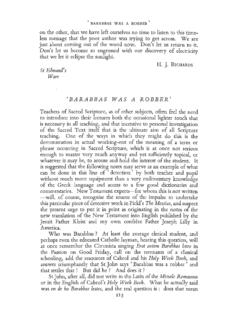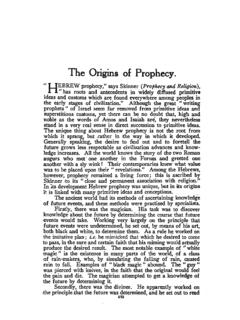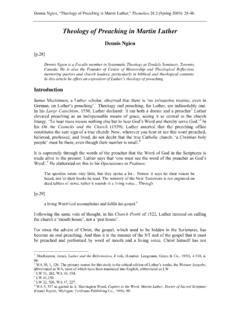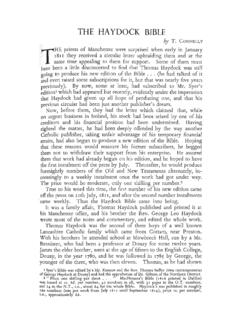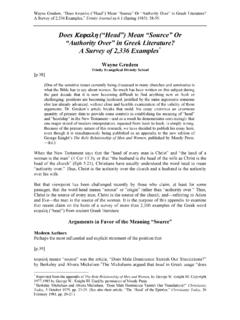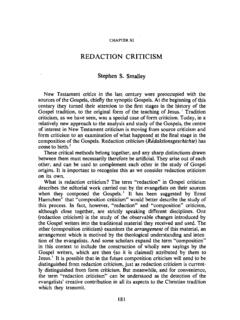Transcription of AFRICAN THEOLOGY: Its History, Dynamics, Scope and …
1 Bowers AFRICAN theology 109. AFRICAN theology : Its history , dynamics , Scope and Future Paul Bowers AFRICAN theology . The term " AFRICAN theology " commonly refers to the lively conversation within the AFRICAN Christian community that, beginning early in the 1960s and increasing unabated to the present, seeks to address the intellectual and theological issues which concern that community. This conversation has attracted interest and significance owing not least to the rapid growth of the Christian community in Africa. which is now the majority faith in . large portions of the continent and is apparently set to become a , {lal centre of world Christianity. The diversity of the Christian community in Africa, and of its theological practitioners, has produced numerous divergent Dr.}
2 Paul Bowers has taught in theological education in Africa since 1968. He has also been involved with the Accrediting Council for Theological Education in Atfica (ACTEA) since 1976, with since 1982 and with BookNotes for .:!fi7ca since 1996. Currently he is the International Administrator of the International Council for Evangelical Theological Education (ICETE). I).r. Bowers holds a PhD in biblical studies from the University of Cambridge in England. This article on "Atiican theology ". appeared last year in the revised edition of the widely used Evangelical Dictionary of theology edited by Waiter A. El well (2nd edition. Grand Rapids: Baker Book House, 200 I), m1der the title, "'Atfican theology '', and is reprinted here (with minor corrections) by permission of the publisher, Baker Book House (PO Box 6287, Grand Rapids, MI 49516, USA).
3 110 Africa Journal of Evangelical theology 2002. approaches to AFRICAN theology . This in turn makes the description and assessment ~t much more challenging. Thus Africa's influential university departments of religion have usually approached the theme in terms of establishing correlations between Christianity and Africa's traditional religions. Missiologists have worked more broadly on a correlation of Christianity with AFRICAN culture as a whole, speaking in terms of an ethnotheology. Roman Catholic contributions have frequently introduced a philosophical note, seeking correlation with the implicit world views of traditional Africa. Ecumenists have pursued not a correlation of Christianity with Africa's past so much as an activation of the Christian community in shaping Africa's future, towards greater liberation and humanisation.
4 Church leaders and theological educators as often as not have assumed that AFRICAN theology denotes little more than providing traditional Christian theology with an AFRICAN face,.furnishing Christian truth with contextually- sensitive illustrations and applications. While all of. these approaches doubtless have a measure of relevance, and together serve to enrich and enliven the common dialogue, perhaps none offers an adequate frame in which to assess the whole. The ongoing phenomenon of AFRICAN theology in the present day is probably best interpreted not in terms of one or more of these approaches but in terms of the patterns of modem AFRICAN intellectual life. It is from within such a frame of reference that the history , dynamics .
5 Scope , and future direction of AFRICAN theology can perhaps best be recognised and assessed. 1. history The. distinguishable roots of the modern-day movement reach back more than a century to Henry Venn and others who, attempting to establish appropriate objectives for the 19th century European missionary movement, called influentially for an indigenization of the Christian faith in mission lands. However poorly this was actualised in missionary endeavours in Africa, it nevertheless set in motion those values and prospects which rendered the core questions of AFRICAN theology inevitable. Thu5. the proto-Africanist Edward Blyden of Liberia utilised the very Bowers AFRICAN theology Ill phrase " AFRICAN theology " in 1897 in expressing his vision for Mrica's future; the mission statesman Edwin Smith in 1936.
6 Produced a theological handbook witl1 intentions entirely congruent with what is now designated as AFRICAN theology ; and the Catholic father Placide Tempels set off a discussion of the implications of Africa's traditional religious "ontolo&>y" for Christian faith, with publication of his classic La Philosophie Bantoue in 1945. The values of Venn. appropriated within 19th century West AFRICAN consciousness, have also been recognised as an essential strand in the emergence at the beginning of the 20th century of the political and cultural movement called Pan-Africanism. in which the expectations of Mrica's educated elite increasingly merged with those of Mrica's Diaspora: in pursuit of the liberation of the continent from colonial rule and the emancipation of the Mrican spirit from the domination of the colonial mindset.
7 By mid-century. as the prospects for imminent independence seized the imagination of the continent. the movement was functioning vigorously on two fronts, the political and the cultural. The latter found expression especially in two consequential congresses. in Paris in 1956 and in Rome in 1959. through which it undertook to identifY the Scope of its intellectual agenda for Africa. Reflections published by a group of Mrican Catholic priests attending the first congress attracted keen interest among their peers. and the second congress then incorporated into its program a subsection for AFRICAN theologians. Stimulated by such events. a public debate was organised the following year at the influential Faculte de Theologie Catholique in Kinshasa.
8 Expressly on the validity of developing an "Mrican theology ." The spirited debate, between the dean of the Faculte Alfred Vanneste and a leading student Tharcisse Tshibangu. was published that same year, 1960. Meanwhile Protestant missionary thinking in the early decades of the 20th Century, still influenced by the vision of an indigenous Mrican church. began to reflect more deliberately on the relevance of AFRICAN culture. 'f'he positive valuation of AFRICAN culture at the first Mrica-widc conference of missions. held in 1926 in Le Zoute. Belgium. led in due course to a greater emphasis on training AFRICAN clergy. This resulted in turn in an e\aluative survey of 112 Africa Journal (~{Evangelical theology 2002. Protestant theological education in Africa.)}
9 And the missionary scholar Bengt Sundkler was tasked to summarise its findings. When his pioneering study. The Christian Ministry in Africa. appeared in 1960. it moved the reader beyond the issues of clergy formation. and included an entire chapter entitled "Christian theology in Africa.". When one traces back through the interactive links in the earliest phase of the AFRICAN theology movement. it becomes apparent that the conversation emerged as an articulate entity largely from these two precipitative events in 1960. the one from within Catholic francophone Africa and derivative of the principal mid-century events of Africa's intellectual life. and the other from within Protestant anglophone Africa and functioning at the cutting edge of the century-old quest for an effective indigenization of AFRICAN Christianity.
10 In the years immediately following the Kinshasa debate and Sundkler's seminal publication. the streams of reflection generated by these two events quickly coalesced. Especially through papers read at consultations and through articles published in journals. but also through several foundational monographs. the movement began to grope towards identity and definition. Among representative contributors in the earliest years were Harry Sawyerr of Sierra Leone. who in an article in 1963 first addressed the issues raised by Sundkler: Vincent Mulago of Congo/Zaire. the first AFRICAN lecturer appointed to the Kinshasa faculty. who published his Un visage africain du christianisme in 1965: and Bolaji Idowu of Nigeria. whose Toward<; an Indigenous Church also appeared in 1965.
